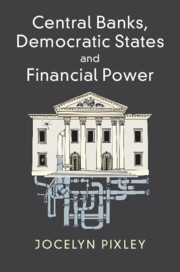Crossref Citations
This Book has been
cited by the following publications. This list is generated based on data provided by Crossref.
Pixley, Jocelyn
2018.
John Kay, Other People’s Money: Masters of the Universe or Servants of the People?
Profile Books: London, 2015; 356 pp.: ISBN 1610396030; ISBN13 9781610396035, RRP AUD23.99..
The Economic and Labour Relations Review,
Vol. 29,
Issue. 4,
p.
549.
Vallet, Guillaume
2019.
This is a Man’s world : autorité et pouvoir genrés dans le milieu des banques centrales.
Revue de la régulation,
Vol. 25,
Issue. ,
2019.
Publications Received.
Contemporary Sociology: A Journal of Reviews,
Vol. 48,
Issue. 1,
p.
114.
Vallet, Guillaume
2021.
Great Power, Great Responsibility: Addressing the Underestimated Issue of Central Bank’s Social Responsibility.
Journal of Central Banking Theory and Practice,
Vol. 10,
Issue. 3,
p.
23.
Vogel, Harold L.
2021.
Financial Market Bubbles and Crashes.
p.
189.
Polillo, Simone
2023.
Crisis, reputation, and the politics of expertise: fictional performativity at the Bank of Italy.
Review of Social Economy,
Vol. 81,
Issue. 3,
p.
342.
Klüh, Ulrich
and
Urban, Janina
2023.
The European Central Bank and Its Role in a Sustainable Finance System.
p.
17.
Thiemann, Matthias
2023.
Is Asking Questions Free of Charge? Questioning the Value of Independent Central Banks through the Lens of a European Credit Council.
Accounting, Economics, and Law: A Convivium,
Vol. 0,
Issue. 0,
Thiemann, Matthias
Büttner, Tim
and
Kessler, Oliver
2023.
Beyond market neutrality? Central banks and the problem of climate change.
Finance and Society,
Vol. 9,
Issue. 1,
p.
14.





